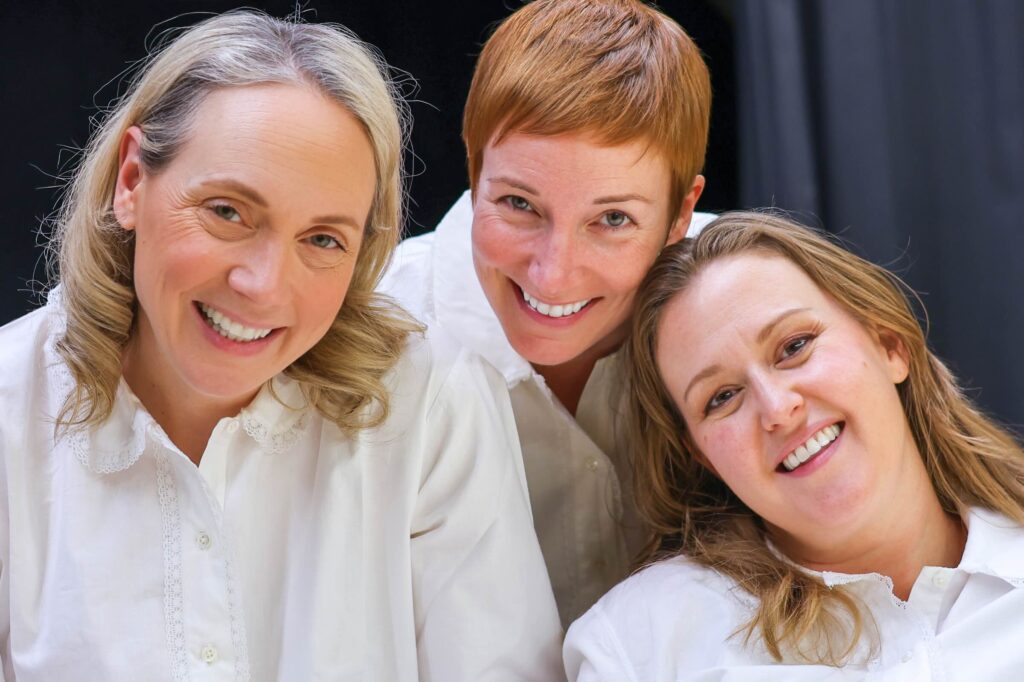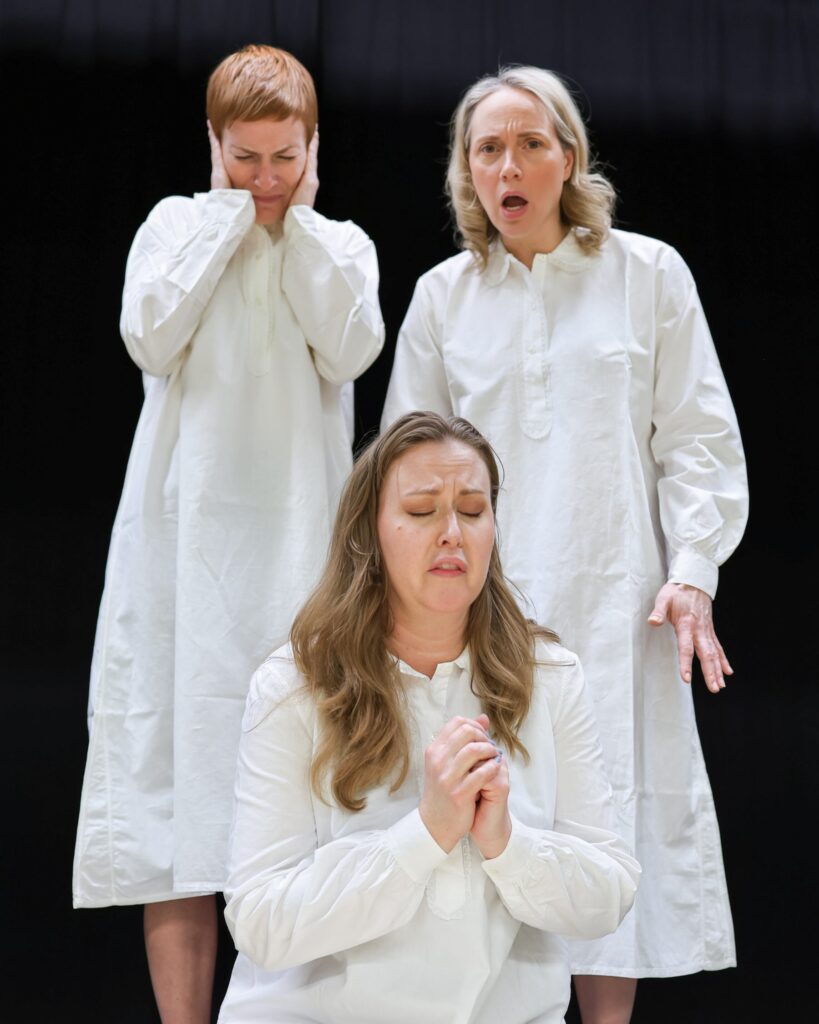REVIEW: Bluebirds soars at Theatre Burlington

Canadian play explores the experiences of frontline nurses in World War I in a thought-provoking, evocative, and emotional way.
On stage now at Theatre Burlington is the evocative play Bluebirds, a deeply thoughtful, poignant, and eminently Canadian story performed by three talented actors embodying the fears, aspirations and hopes of nurses serving overseas during World War I. A new matinee performance has just been added on April 26.
Bluebirds is a relatively new play that had its premiere run less than three years ago, and it provides a truly fresh take on the subject of the Great War and its meaning for the women and men whose lives were irrevocably shaped by the conflict. Lest theatregoers get the wrong idea, the play, although serious and dramatic in nature, avoids feeling turgid and stale. This is not “just another war play.” Rather, Bluebirds brings to life an experience of war of which many may not be aware, that of the nurses tasked with patching up and returning to the front injured and traumatized soldiers exposed to the brutalities of modern warfare.
Its writer Vern Thiessen is an award-winning, Winnipeg-born playwright who was born in the 1960s and educated at the University of Winnipeg as well as the University of Alberta. He is a past president of both the Playwrights Guild of Canada and the Writers Guild of Alberta.
Thiessen received a Governor General’s Award for his play Einstein’s Gift, and was also a finalist with his play Lenin’s Embalmers. Bluebirds is one of the most recent works in Theissen’s catalogue, which also includes Of Human Bondage, Vimy, Apple and Shakespeare’s Will. His plays have been widely produced across the country as well as internationally, with his scripts having been translated into five languages and produced off-Broadway.
In 2020, Bluebirds had a development workshop at Theatre New Brunswick where it then premiered in October 2022. In the play, three nurses relay the personal journeys that have brought them across the Atlantic in 1918 to end up in a war hospital in Étaples, France. Garbed in blue uniform dresses with white headscarves and aprons, these Bluebirds are responsible for treating an endless line of mostly Canadian soldiers brought from the front, brutalized in an ever-evolving list of ways. The nurses, Maggie, Bab and Christy are a long way from the West Coast, Manitoba and Brantford, Ontario, and we confront with them the immediate necessity of having to bluntly triage the incoming wounded according to their likelihood of survival.
As the playbill mentions: “In WWI, more than 2,800 nurses, known as Bluebirds, served in the Canadian Army Medical Corps (CAMC), as fully-enlisted officers.” The Canadian War Museum website provides more context, much of which is alluded to in the well-researched script: “Canadian military nurses were required to be trained nurses before enlistment … (and) also required women to have British citizenship, to possess high moral character, physical fitness, and be between the ages of 21 and 38.”

Photo: Teryn Lawson
The cast of the Theatre Burlington production is composed of Jennifer Graham (Christy), Vanessa Scott (Bab), and Christine Marchetti (Maggie), all returning performers to the Theatre Burlington stage. They deserve great praise for what a well-calibrated set of performances they give. It would not serve the story for any one of the three to shine above the others, and yet what a challenge they meet to work in genuine balance with one another. The trio of actors do a marvelous job bringing the script to life, gradually becoming accustomed to life at the camp and building friendships with one another. At the same time, the actors capably build the audience’s relationship with each of them, unfurling their backstories to allow us to truly sympathize with them. They come across as fully realized women who we might have counted among our own family members.
Some of this is done through letters to loved ones. Each woman has aspirations, fears, and a longing for things out of reach. For each of them, certain relationships or the desire for one, shapes their notions of what is possible and meaningful in their lives. Working as war nurses literally regiments their lives and yet provides them with more independence than the average woman of that era. The world is changing in terrifying and tantalizing ways.
Amidst this, the trio grow closer and build a lasting friendship, resolving to stand by one another, come what may. We watch as they are exposed to (unseen) ghastly injuries, overwhelming and exhausting duties, and the terror of air raids in the dead of night. There are moments of simple joy, linking arms and walking along the ocean’s shore, their skirts tucked up in their belts and their veils plucked off, the sweetness of some pilfered wine and sandwiches in their bellies.

The set is very simple, mostly a half-circle arrangement of army cots. Most scenes are imagined, and the production succeeds in making audience members feel invested and involved in the story without very many props at all. The injured soldiers are never seen, but always present.
The play is extremely thoughtful, not only of the experience of war nurses and women of the era, but also of other social issues and the complexities created by warfare. I was very impressed by the discussion of topics like shell shock, “cowardice” (purposefully shown in quotations), chemical weapons, same-sex love, out-of-wedlock pregnancy, women’s suffrage, and the Spanish flu within the script. It reminds us that some experiences are not the modern inventions we sometimes believe them to be, while others are indeed new horrors of our own invention.
Then, just when we have grown so fond of and worried for Christy, Bab, and Maggie, we are reminded that this is a world war, and a happily-ever-after would be a flight of fancy. With the use of sound, flashes of light, and only a few moments of half-heard voices, the world comes crashing down. It would take a stoic person indeed to avoid some shedding of tears or a lump in the throat at the play’s climax.
Bluebirds gifts us with a bittersweet and ethereal ending to sooth us, and special mention must be made of the costume team (Tara Dimitrovski, Marie Dickie, Helena Adamczyk) for the haunting garb the actors wear at the play’s end as well as the proud and crisp Bluebird uniforms. Compliments also must be given to the crew, especially but not limited to the sound and lighting designers and operators (including Peter Jonasson, Michelle Spanik, Ashley Swerdon, Tricia Ward, David Hutton, Todd Smedley, Chuck Learn, and John Spanik).
Congratulations to director Graham Clements as well as assistant director and producer Deb Dagenais on the thought-provoking and moving production of Bluebirds.
Next up for Theatre Burlington is its second annual short play festival, Play Time 2, to be held over two weekends on June 13, 14, 20 and 21. A diverse slate of 10-minute plays by local playwrights will be performed nightly at 7 p.m. along with 2 p.m. matinees on the Saturdays of the festival. Tickets are $15.
NEED TO KNOW
Bluebirds continues April 25 & 26, 8 p.m. and April 26, 2 p.m. matinee
Approximately 75 minutes without an intermission
Theatre Burlington
2311 New St., Burlington
Box office: (905) 639-7700
Tickets: theatreburlington.on.ca
Adults: $30, Seniors: $27














